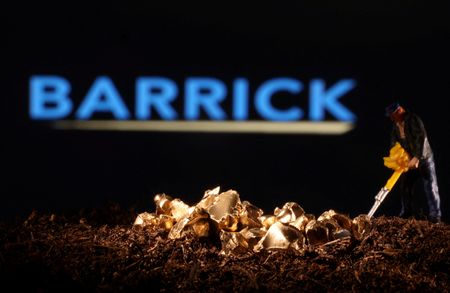By Felix Onuah and Liz Lee
BEIJING/LAGOS (Reuters) -China vowed to encourage its more “powerful” companies to invest in Nigeria, which in turn said it was open to Chinese companies building factories and developing its energy and mineral resources, after the two nations’ leaders met in Beijing.
China welcomed Nigeria to its e-commerce and logistics sector and said it wanted to help the West African nation’s economy “diversify and flourish”, according to a joint statement released after President Xi Jinping and his Nigerian counterpart Bola Tinubu met on Tuesday.
They held talks ahead of a summit of 50 African nations in Beijing this week which the Chinese leader called an opportunity to consolidate China-Africa relations.
“China and Nigeria, as major developing countries, strengthening strategic coordination, will inject fresh impetus to China-Africa relations in the new era and spearhead common progress among Global South countries,” Xi said.
The two countries agreed to encourage “flexible and diverse” regional monetary and financial cooperation, such as local currency swaps, to promote bilateral trade, the statement published by China’s official news agency Xinhua said.
China supports Nigeria in improving its military technology, equipment, intelligence and other capabilities, it said, adding they agreed to work to maintain peace, security and stability in the Sahel region, the Gulf of Guinea and other regions.
They also agreed to cooperate on intelligence to combat money laundering and terrorist financing.
The two sides plan to strengthen ties in China’s Belt and Road Initiative, human resources development and nuclear energy, a Nigeria government spokesperson said.
The Belt and Road Initiative has already delivered massive infrastructure projects in Nigeria, from a deep sea port to rail lines.
“This comprehensive strategic partnership should result in robust development, stability, and security in the West African sub-region,” Nigeria’s Tinubu said.
China is Nigeria’s biggest bilateral lender, with loans amounting to $5 billion at the end of March, according to figures from Nigeria’s Debt Management office.
Tinubu toured the Huawei Research lab and secured a commitment from Huawei to establish a joint solar PV test lab in Nigeria.
Another Chinese firm also pledged to establish an assembly plant for electric tricycles and train Nigerians in technology and renewable energy development.
(Reporting by Felix Onuah in Lagos and Liz Lee in Beijing; Writing by Isaac Anyaogu; editing by David Evans and Sonali Paul)










